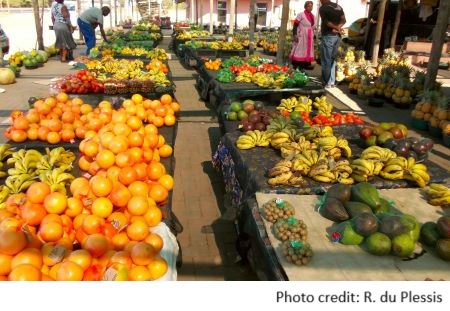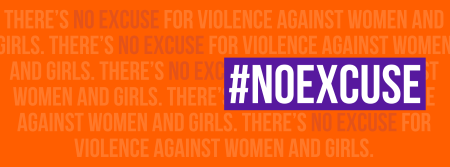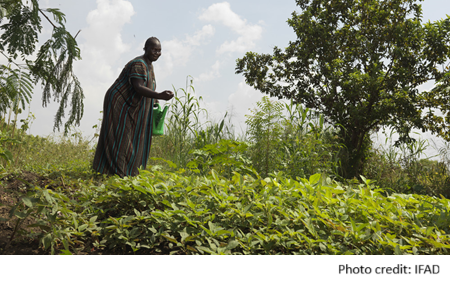As we start to think about life beyond COVID-19, many are yearning for a return to "normal", while others -- especially in the international development and environmental justice communities -- are envisioning a just recovery, where we address long-standing issues of poverty and inequity to create a just and sustainable future.
In an article featured in the online magazine Policy Options, Chris Dendys, Executive Director of Results Canada, shares eight lessons COVID-19 teaches us about the world we have and the world we need. She concludes her article with this global call to action:
"As global leaders invest in responding, reconstructing and rebuilding at home and abroad, let’s not repair our world to restore its existing and persistent state of inequity. We have the opportunity to learn from the lessons of COVID-19 and rebuild our world for the better. Together, we can aspire to the world we need: a healthier, equitable, and more resilient world for all."
You can read the full article by clicking here.
Alex Neve, Secretary General of Amnesty International Canada, calls for a human rights focus in the global response to the coronavirus crisis. He identifies four human rights principles essential in the pandemic response and also looks ahead to the long-term human rights work that will be required in the aftermath of the crisis.
You can read his message here.
"What is a hackathon?" you may ask. The World Health Organization (WHO) in Africa just held its first three-day hackathon, an online gathering of 100 of sub-Saharan Africa's leading innovators working together to generate creative local solutions to the COVID-19 pandemic.
Click here to learn more.
CBC radio host Matt Galloway recently interviewed AIDS-Free World activist and humanitarian Stephen Lewis to discuss how the COVID-19 pandemic could affect Africa. If you missed this conversation you can listen now by clicking here.
Suffering in Silence, a report recently released by CARE International, identifies the ten most under-reported humanitarian crises of 2019. Nine of the ten crises occurred in sub-Saharan Africa, in the countries of Madagascar, Central African Republic, Zambia, Burundi, Eritrea, Kenya, Burkina Faso, Ethiopia and in the Lake Chad Basin. In 2020 it is estimated that 2% of the global population (160 million people) will require USD $28.8 billion in humanitarian assistance to survive.
The majority of the crises described in the report are partly a consequence of declining natural resources, increasing extreme water events, and global warming. As climate change intensifies, so does humanitarian need. Crises linked to climate change are often slow-moving, recurrent and protracted. Often when they do receive media attention, the focus is not on mitigation or adaptation but on consequences such as people forced to flee their homes, violent extremism, and hunger.
Media attention can shape the degree of public empathy for a crisis and can influence how much international funding it receives and how foreign policy priorities are formed. The report describes seven ways in which we can all shine a light on people in crises who are otherwise forgotten. The COVID-19 experience is a good illustration of how media coverage can shape empathy and public financing.
Read report here.
In these anxious times as we all try to stay informed, you may have noticed that little is yet being reported by main news outlets about the spread of COVID-19 in Africa.
Click here for the latest report on the pandemic situation in Africa from the World Health Organization.
And click here for an article on the multiple challenges African nations face.
International Women's Day -- March 8 -- is a global day celebrating the social, economic, cultural and political achievements of women. The day also marks a call to action for gender equality.
In two separate reports issued this week by UN Women and Equal Measures 2030 we learn that the work to advance gender equality is far from finished.
The UN Women report shares six cross-cutting areas where governments and stakeholders should focus efforts to realize gender equality and the health and rights of girls and women:
- Inclusive economies and decent work
- Poverty eradication and wellbeing, including strengthening women’s sexual and reproductive health and rights
- Freedom from violence, stigma, and stereotypes
- Participation, accountability, and institutions
- Peaceful and inclusive societies
- Climate action and environmental sustainability
“These reports add to the mounting evidence that a more gender-equal world is possible if we invest in girls and women. Decision-makers should seize this new evidence and the current spotlight to make bigger, bolder commitments and take strong action towards advancing gender equality and sexual and reproductive health and rights. Not in another 25 years, but now,” says Katja Iversen, President and CEO of Women Deliver.
Click here to read key findings and to access the full text of both reports.
In a historic decision on Friday, February 28, the Supreme Court of Canada ruled that a human rights lawsuit against Vancouver-based mining company Nevsun Resources Ltd. can be heard in British Columbia, even though the alleged human rights abuses occurred in Eritrea. This decision is important because it clarifies that Canadian companies can be held accountable in Canada when implicated in human rights violations overseas, something GRAN and other civil society organizations have been advocating.
You can read more about this landmark ruling here.
An enthusiastic group of GRAN volunteers is busy finalizing plans for GRAN’s upcoming national gathering, Hello Friends 2020. This year we will be gathering in Toronto at Ryerson University from June 8 - June 10. Those who have attended this bi-annual gathering in the past know that it provides a rich opportunity for friendship, learning, and reigniting our shared passion for justice. We always come away inspired, strengthened, and energized. This is a terrific opportunity for those new to GRAN to dive in and learn a lot quickly, and for long-timers to renew ties with GRANs from other regions and to learn new things too! Hello Friends is by far our most valued GRAN event for providing face-to-face connection to share and explore new ideas together and to offer input into GRAN’s vision and priorities going forward.
Program details will be coming soon. In the meantime, save GRAN a spot on your June calendar and please do consider joining us!
During the 16 Days of Activism Against Gender-Based Violence, the Nobel Women’s Initiative is highlighting the lives of courageous human rights defenders. Click here to meet Gladys Arthur from Liberia and hear her tell her story in her own words.
Pages


